As seen in the last post, six of the seven children born to Berthold Goldschmidt and his wife Mathilde Freudenstein died early in life, including their son Leopold, who was killed in World War I fighting for Germany. The only child who one survived to adulthood was their youngest son Siegfried.
Siegfried was born on April 15, 1896, in Oberlistingen:

Siegfried Goldschmidt birth record, Hessisches Hauptstaatsarchiv; Wiesbaden, Deutschland; Bestand: 909; Signatur: 8079, 1896, Ancestry.com. Hesse, Germany, Births, 1851-1901
Matthias Steinke of the German Genealogy group kindly translated this record for me:
Nr. 10
Oberlistingen, at the 20st April 1896
To the below signing registrar came today the personally known merchant Berthold Goldschmidt,
residing in Oberlistingen Nr. 56, jewish religion, and reported, that by the
Mathilde Goldschmidt, born Freudenstein, his wife, jewish religion, residing at him,
in Oberlistingen, in his residence, at the 15th April of the year 1896, pre midday at four o’ clock a child of male gender was born, who got the firstname
Siegfried.
Readed, confirmed and signed Berthold Goldschmidt
The registrar signature
Note the addition made to the right in 1938 after the Nazis required all Jewish men to take the name “Israel” as a middle name:
right text:
Oberlistingen, at the 17th December 1938
The beside named has “suddenly” taken the first name “Israel”
The registrar
(signature)
The correctness with the main register is herewith certified.
Oberlistingen, 17th December 1938
Siegried married Fanny Frieda Pless on April 18, 1922, in Frankfurt, Germany. Fanny Frieda was born on August 6, 1895 in Zachan, then part of Germany in the Pomeranian region, but today known as Suchan in Poland. As Siegfried and Fanny Frieda were married in Frankfurt, I assume that Fanny Frieda’s family must have relocated to Frankfurt sometime after her birth. According to the marriage record (also generously translated by Matthias Steinke), Siegfried was living at the time in Holzminden and Fanny Frieda in Frankfurt. Holzminden is about 180 miles north of Frankfurt and 36 miles north of Oberlistingen where Siegfried was born. How did Siegfried meet Fanny Frieda, a woman born far from where he was born and living far from where he lived? I don’t know.
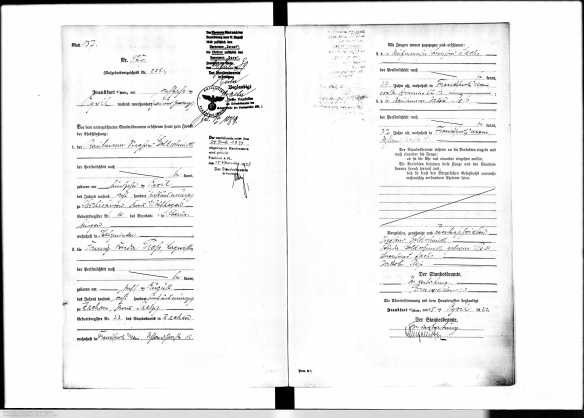
Siegfried Goldschmidt and Fannie Pless marriage record, Hessisches Hauptstaatsarchiv; Wiesbaden, Deutschland; Bestand: 903 Ancestry.com. Hesse, Germany, Marriages, 1849-1930
Nr. 427
(bann-register nr. 235)
Frankfurt/Main, at the 18th April 1922
To the below signing registrar came today for the reason of a marriage:
1. the merchant Siegfried Goldschmidt, known personally, born at the 15th April of
the year 1896 in Oberlistingen, county of Wolfhagen, birth-register nr. 10 of the civil-registration-office
Oberlistingen, residing in Holzminden,
2. the Fanny Frieda Pless, warehouse assistant, known personally, born the 6th August 1895 in
Zachan, county of Saatzig, birth-register nr. 23 of the civil-registrationoffice in Zachan, residing
in Frankfurt/Main, Uhlandstrasse 15.
As witnesses were present:
3. the hatmaker Bernhard Lachs, known personally, 37 years old, residing in Frankfurt/Main,
grosse B…kt 12,
4. the merchant Jakobi Pless, known personally, 72 years old, residing in Frankfurt/Main, Uhlandstrasse 15,
The registrar asked the engaged couple one after another whether they want to marry each other.
After both confirmed this question, he declared, that they are from now on a legally married couple.
Read, confirmed and signed
(signatures)
This document was also amended in 1938 to reflect the Nazi requirement that Siegfried take the middle name Israel and Fannie the middle name Sara to identify them as Jews and then to reflect the cancellation of that amendment in 1949 after the war:
According the law from August 17, 1938 gets
the groom the additional first name Israel, the bride the additional first name
Sara,
24th July 1939
The regisrar
This order was cancelled by the registrar at the 24th July 1949.
As far as I have been able to find, Siegfried and Fanny Frieda had only one child, a son named Max born on November 30, 1924, in Frankfurt.1
Tragically, Siegfried and Fanny Frieda were both murdered in the Holocaust. They were deported to the Warsaw Ghetto in 1942 and killed sometime thereafter.2 These are the first Goldschmidt family members I’ve located who died in the Holocaust, but I fear not the only ones. I just haven’t yet found the others. Given that Siegfried’s brother Leopold had died fighting for Germany in World War I, Siegfried and Fanny’s deaths are that much more painful and infuriating. The cruel irony and immorality of that just leave me stunned.
Recently I had an opportunity to make that point to the Goldschmidts’ hometown, Oberlistingen. Back in September, I was contacted by my friend Ernst Klein, who had been our guide in Volkmarsen, Breuna, and Oberlistingen back in 2017. Ernst told me that he was involved in planning an event to take place in Oberlistingen to commemorate the Jewish soldiers who fought for Germany in World War I. He asked whether I would be willing to write some remarks to be read at the ceremony since my cousin Leopold Goldschmidt was being honored at the ceremony.
When Ernst told me that Leopold had been killed in World War I, it was new information for me as I had not yet found any record of Leopold’s death. Nor did I then know what had happened to Leopold’s younger brother Siegfried. How I wish I had known what I now know about Leopold and Siegfried so that I could have made my remarks more personalized and specific. Instead I drafted some general remarks and sent them to Ernst.
My remarks were translated into German and printed in the September 21, 2018, issue of Hessische Niedersächsische Allgemein (p. 3):
Here is my best attempt at translating the article with much help from Google Translate and a dictionary:
Caption under picture: Changed in the footsteps of her Jewish ancestors: Amy Cohen of Massachusetts/America visited the home of her ancestors last year. Ernst Klein, chairman of the association Flashback-Against Forgetting, accompanied her and told her a lot about the history of the Jewish inhabitants in the area of North Hesse.
May it never happen again
Peace Weeks: Remarks of Amy Cohen, a Jewish woman from America
OBERLISTINGEN. As a sign of peace and hope, a ginkgo tree was planted as part of Peace Week in Wolfhager Land at the cemetery in Oberlistingen. The war memorial commemorated the dead who died in the First World War, including Leopold Goldschmidt. The name Goldschmidt is on the plaque at the cemetery as “Goldsehmied” and is probably a distortion of the name. An additional plaque at the memorial calls for tolerance and vigilance. The lecture by Jürgen Damm, Honorary Chairman of the Volksbund German War Graves Welfare (VDK), addressed the history of German Jewish soldiers in the First World War.
As part of the prayer of peace in the church in Oberlistingen, Ernst Klein, chairman of the association Flashback-Against Forgetting, read aloud a greeting from Amy Cohen. She is a relative of Leopold Goldschmidt and lives in Massachusetts/USA. In her greeting, she writes:
“In May 2017, my husband and I had the great pleasure of visiting Germany to see where my father’s ancestors once lived. My visit here in northern Hesse was very moving. It was wonderful to meet so many kind-hearted and hard-working people like Ernst and his colleagues who do everything they can to preserve the history of the Jewish communities that once existed in this area. I am also moved that today people are reminded of the Jewish soldiers who fell in the fight for their German homeland in the First World War, as did my distant cousin Leopold Goldschmidt of Oberlistingen.
And it is also important to remember those Jewish men who survived their service in the German army. Far too many of these men were victims of Nazi persecution 20 years later, despite having fought for Germany in World War I.”
And she goes on to write: “I know that today there are many people in Germany, the US, and elsewhere in the world who are spreading hatred, prejudice and anti-Semitism again. We must do everything we can to remember the past so that what happened under Hitler will never happen again.”
I am glad that I made that point about Jewish soldiers who fought in World War I becoming targets of Nazi terror, but I wish I could have told the specific story of Leopold and Siegfried instead. It would have been much more personal and more powerful.
UPDATE: In February 2020, Julia Drinnenberg sent me these photographs of Leopold and Siegfried taken during their service in World War I and the index cards describing their service. She also translated the cards for me, as seen below.
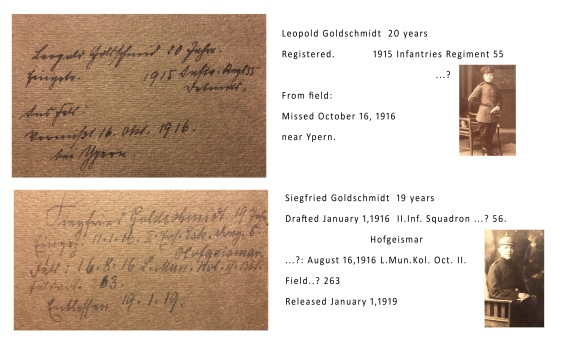
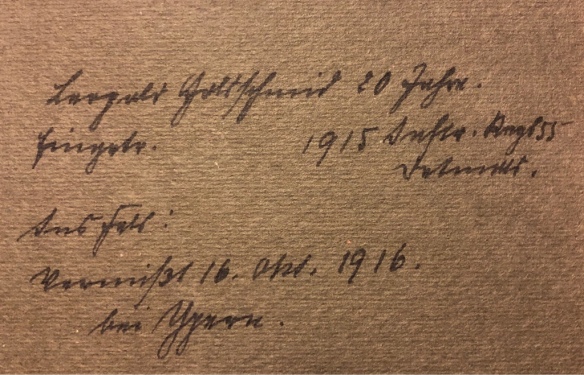
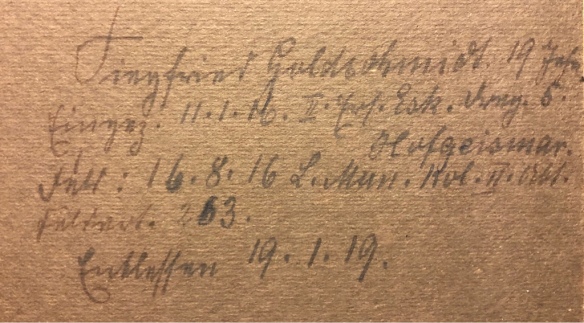
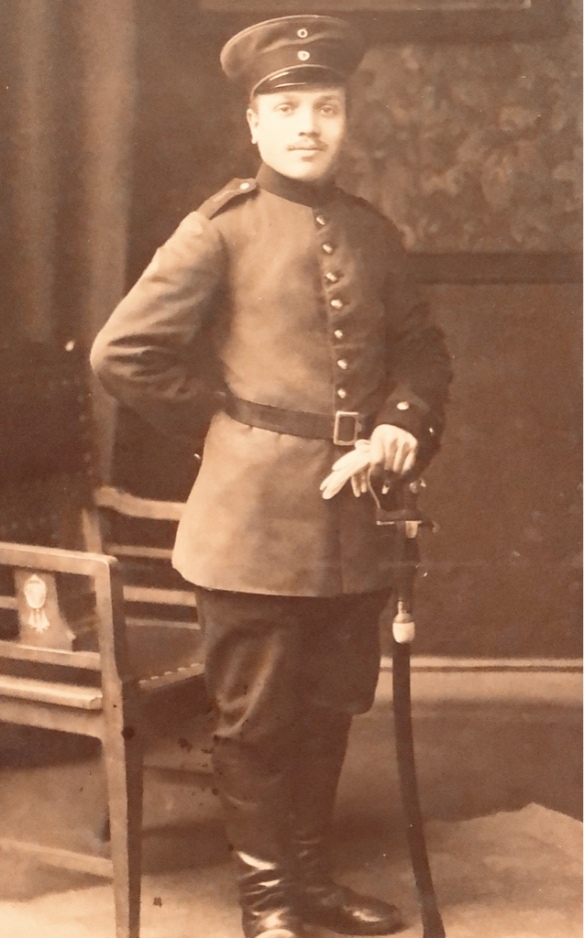
Leopold Goldschmidt
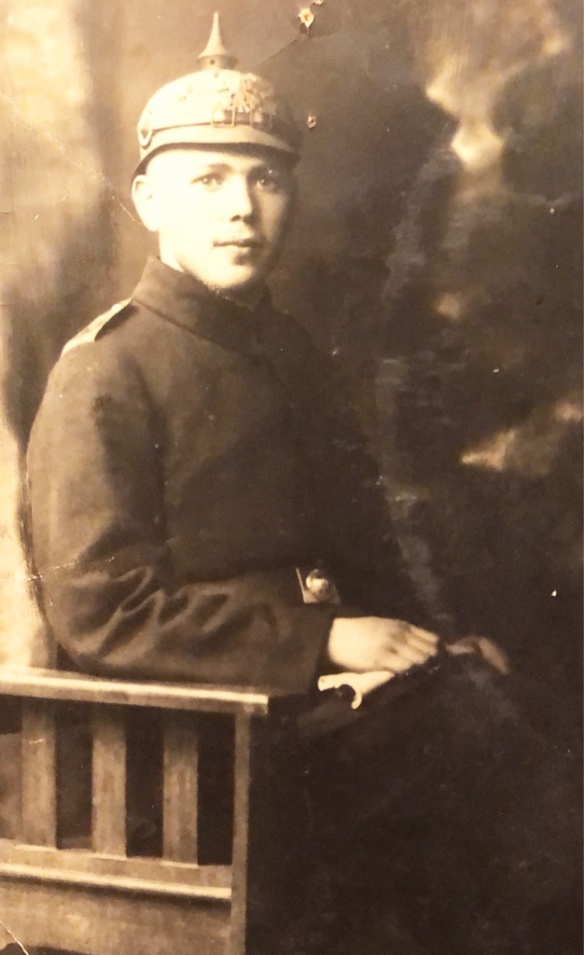
Siegfried Goldschmidt
There was one bright light left for this family. Somehow Siegfried and Fanny Frieda’s only child, their young son Max, survived. His story in the next post.


Of course now I am anxiously awaiting the post about Max but the fact that your words and thoughts were included in this memorial celebration is amazing in itself. Thoughtfully written and perfect for the timing ~ Sharon
LikeLiked by 2 people
Thanks, Sharon. I just wish I’d known then what I know now—it would have been more powerful.
LikeLiked by 2 people
I totally understand what you mean.
LikeLiked by 2 people
I am so happy their son survived. I have too many families where no one survived. It so hurts my heart when I discover that news.
LikeLiked by 2 people
I always have to catch my breath, and somehow involuntarily I sigh and utter “Oh no” each and every time.
LikeLiked by 1 person
I feel that pain. I am also glad they published your comments!
LikeLiked by 1 person
I am also. I just wish I’d known Siegfried and Leopold’s story back in September.
LikeLiked by 1 person
The stories unfold in their own time. We do our job to help the memories stay alive.
LikeLiked by 2 people
You’re right. We can’t rush the process. Thanks! And shabbat shalom!
LikeLiked by 2 people
Shabbat shalom to you as well.
LikeLiked by 1 person
Thank you!
LikeLike
I’m so glad that you were able to contribute to the memorial ceremony, even without the knowledge that would have allowed you to make your words more personal. It is always heartening to know that communities are actively remembering.
LikeLiked by 1 person
You are right. Su. That is actually the most important thing about that event.
LikeLiked by 1 person
And more important than ever 😀
LikeLiked by 1 person
What a horror story for all of us readers and for you writing it, Amy! The addition of Israel and Sara to the names of the married couple was a sinister plot to make identification of Berthold Goldschmidt and his wife easier for the deportation and murder in the Warsaw Ghetto. I am looking forward to read the survival story of their only child Max.
LikeLiked by 1 person
It is a horror story, Peter. Thank you for your thoughts. We can only hope the world has learned from what happened, but sadly we seem to still have too much hate in this world. Have a good weekend!
LikeLiked by 1 person
It’s amazing to see how the passion for your family history has developed over the years on your blog to the point of having your words read as part of a prayer for peace. Knowing the stories of Leopold and Siegfried might have made your message stronger but I believe you and Ernst Klein got the point across that what happened under Hitler should never happen again.
LikeLiked by 1 person
Thanks, Cathy. I appreciate that. I hope I did a fairly decent job of translating the German in that article. It was funny to see my words (written obviously in English) translated to German and then translating them back to English!
LikeLiked by 1 person
I find Google is good at translating well-written text and only a bit of fixing is needed for it to make sense. Still there are always words and phrase that cannot be translated exactly – or to satisfy people fluent in the languages. In the subtitle, Mahnende Worte suggests admonishing or threatening words but when translated into English they don’t sound as harsh. You did a good job, Amy.
LikeLiked by 1 person
Thanks, Cathy. It was interesting to see how the retranslation of the translation compared to my original words in English. I did adjust a bit to make sure that my English-reading readers (99% at least!) read an accurate statement of what I’d said. And Google Translate has a really hard time with German sentence structure (as do I) so that took some editing to make the sentences make sense in English.
LikeLiked by 1 person
What an honor to have participated in the ceremony – your words were very powerful.
LikeLiked by 1 person
Thanks, Debi. I hope the message got across in Oberlistingen.
LikeLike
That’s great that your remarks were published. Congratulations, Amy! And a great tribute for your family.
I must admit that I never knew about the requirement to add Israel and Sara as middle names to identify individuals as Jewish. It seems surprising that the law remained on the books so long after the war and wasn’t canceled until 1949.
LikeLiked by 1 person
I think the law was eliminated long before 1949; it just took that long to go back and correct all the records to eliminate those name changes. Thanks for reading, Michael!
LikeLike
Amy, your recent discoveries make for an important update to what was written in 2017. Maybe Ernst can contact those involved with the memorial efforts, which I think should be ongoing, to perpetuate the memories of Jewish soldiers who fought for Germany in WWI. The additional information about Leopold makes a good update for the rest of the story and would appeal to readers of the newspaper where your original comments were published.
LikeLiked by 1 person
I did send Ernst my blog posts with the information about Leopold and Siegfried, so perhaps he will pass it on to the paper. Thanks, Emily!
LikeLiked by 1 person
Good move!
LikeLiked by 1 person
Pingback: Max Goldschmidt: A Survivor | Brotmanblog: A Family Journey
Pingback: Milton Goldsmith’s Family Album, Part III: Finding Hettie Steele | Brotmanblog: A Family Journey
Pingback: Berthold Goldschmidt Revisited: His Second Family | Brotmanblog: A Family Journey